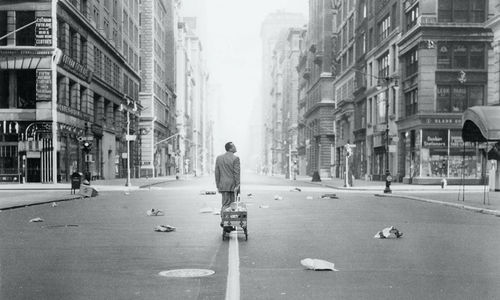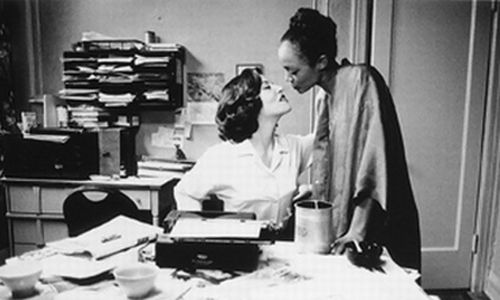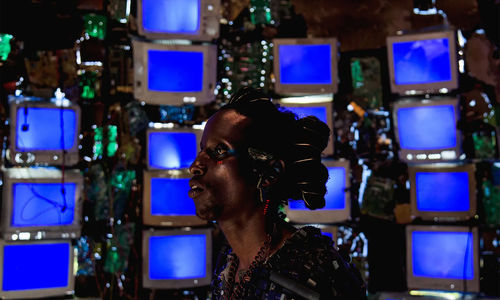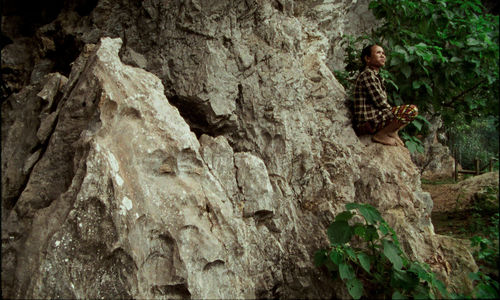
Contested Space(s): Cathode-Ray Tube Afrofuturism
- This is a past program
Presented by the UCLA Film & Television Archive.
Part of the UCLA Film & Television Archive screening series Science Fiction Against the Margins. Learn more at cinema.ucla.edu.
With cameras pointed toward the skies, historically, the television lens has framed the aspirations and triumphs of America’s space program as a largely patriotic, mostly homogeneous final frontier. Concurrently, amid the fanfare of rockets and moon shots, artists of vision and conscience have disrupted such regularly scheduled TV programming to contest the cool medium’s status-quo constructions of race, space and place. Breaking the barriers of the cathode-ray tube, these counter-narratives expand the small screen universe, centering African Americans in humankind’s reaching endeavors to explore strange new worlds. Through poetry, music and allegorical drama, this assembly of provocative broadcasts explicates unjust conditions on Earth while challenging the mythos of a benevolent, star-spangled military-industrial complex that serves as gatekeeper to the galaxies.
Black Wax [excerpt] (1982)
Director Robert Mugge’s acclaimed television documentary Black Wax serves up empirical evidence as to why Britain’s Melody Maker magazine once described activist and artist Gil Scott-Heron as “the most dangerous musician alive.” In this pointed excerpt, rap forefather and poet extraordinaire Scott-Heron speaks for all people living in poverty while billions are spent reaching the moon. Then, in solidarity with those seeking refuge via the Rio Grande, maestro Scott-Heron deconstructs the notion of “aliens.”
DCP, color, 8 min. BBC. Production: A Mug-Shot Production for Channel Four. Producer: Robert Mugge. Director: Robert Mugge. With: Gil Scott-Heron and the Midnight Band.
The Outer Limits: “Nightmare” (12/2/1963)
Pioneering talents James Shigeta (Flower Drum Song) and Bill Gunn (Ganja & Hess) co-star in this unsettling ensemble drama about a multicultural space force from Earth taken prisoner of war by hostile aliens. Written and produced by Joseph Stefano (screenwriter of Psycho), the incendiary, expressionistically staged morality play tackles so-called military ethics and the othering of foreign enemies.
DCP, b&w, 50 min. ABC. Production: Villa di Stefano production in association with Daystar Productions. Executive Producer: Leslie Stevens. Producer: Joseph Stefano. Director: John Erman. Writer: Joseph Stefano. With: James Shigeta, Bill Gunn, Martin Sheen.
The Space Program (2018)
Directed by Warren Fu, this uncompromising music video by the highly influential rap group A Tribe Called Quest envisions the U.S. space program as a natural extension of a racist socio-political apparatus long engaged in gentrifying communities and oppressing and murdering Black Americans.
DCP, b&w, 8 min. Production: A Tribe Called Quest Presents a Partizan Production. Executive Producer: Whitney Jackson. Producer: Jona Ward. Director: Warren Fu. With: Q-Tip, Phife Dawg, Jarobi White, Ali Shaheed Muhammad.
Cosmic Slop: “Space Traders” (11/8/1994)
In this biting satirical segment of the HBO anthology trilogy hosted by Parliament-Funkadelic’s Mothership Captain George Clinton, space aliens arrive in the United States offering wealth and an unlimited energy supply that will solve all of the country’s problems. In return for this globe-altering technology, the extraterrestrials demand that all African Americans leave Earth to a fate unknown. While a prominent member of the president’s cabinet (Robert Guillaume) opposes the mass deportation, America is tasked to vote on a special referendum that will determine if the gift should be accepted under such immoral terms.
DCP, color, 33 min. HBO. Production: The Hudlin Brothers. Executive Producers: Reginald Hudlin, Warrington Hudlin. Producer: Ernest Johnson. Director: Reginald Hudlin. Writers: Trey Ellis, Derrick Bell. With: George Clinton, Robert Guillaume, Michele Lamar Richards.
Star Trek: Deep Space Nine: “Far Beyond the Stars” (2/11/1998)
Directed by and starring series lead Avery Brooks, this hard-hitting time travel drama finds 24th-century space station captain Benjamin Sisko (Brooks) in Harlem, New York, circa the 1950s. There, inhabiting the persona of a science fiction writer for a pulp sci-fi magazine, Sisko is devastated when his highly accomplished short story about a Black starship captain is rejected as unprintable. The existential threat of pervasive 20th-century racism presents further horrors as Sisko encounters police violence with a shattering toll. In 2023, Variety ranked the charged episode fourth best among all Star Trek episodes produced across the entire franchise.
DCP, color, 45 min. Syndicated. Production: Paramount Entertainment. Executive Producers: Ira Steven Behr, Rick Berman. Director: Avery Brooks. Writers: Ira Steven Behr, Hans Beimler, Marc Scott Zicree. With: Avery Brooks, Brock Peters, Penny Johnson.
The UCLA Film & Television Archive is a division of UCLA Library, and presents its public programs in the Billy Wilder Theater at the Hammer, among other venues. For more information about the Archive, visit cinema.ucla.edu.
ATTENDING THIS PROGRAM?
Ticketing: Admission to Archive screenings at the Hammer is free. Your seat will be assigned to you when you pick up your ticket at the box office. Seats are assigned on a first come, first served basis, limit one per visitor. Box office opens one hour before the event. Questions should be directed to the Archive at programming@cinema.ucla.edu or 310-206-8013.
Member Benefit: Subject to availability, Hammer Members can choose their preferred seats and pick up tickets for one additional guest. Members receive priority ticketing until 15 minutes before the program. Learn more about membership.
Parking: Self-parking is available under the museum. Rates are $8 for the first three hours with museum validation, and $3 for each additional 20 minutes, with a $22 daily maximum. There is an $8 flat rate after 5 p.m. on weekdays, and all day on weekends.
Read our food, bag check, and photo policies.
Read our COVID-19 safety guidelines.













